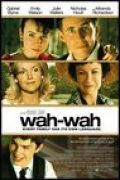
Directed by
Richard E.Grant
97 minutes
Rated M
Reviewed by
Andrea Buck

Wah-Wah
Synopsis: In Swaziland during the last days of British colonialism, a young boy, Ralph Compton (Zachary Fox,) has his childhood suddenly shattered when he witnesses his mother (Miranda Richardson), having sex with her lover. The family disintegrates soon after and the boy is left alone and emotionally neglected when his mother abandons the family to the isolation of life in uptight colonial Swaziland. His father (Gabriel Byrne), the Minister of Education, plummets into alcoholism and young Ralph is sent away to boarding school, returning (now played by Nicholas Hoult) to find his father married to Ruby (Emily Watson), a brash, though refreshingly rebellious American ex-air hostess who refers to the ridiculous British ex-pat speak as a bunch of old "Wah-Wah".Richard E. Grant in his directorial debut both wrote and directed this semi-autobiographical coming-of-age story and fought hard to have it shot in his childhood home of Swaziland. We are given a fairly accurate depiction of the heavy drinking, adulterous, hypocritical colonial lifestyle in which children are sent away to boarding school, ever-loyal servants perform their duties with enthusiastic smiles and ex-pats hold onto their monarchism with fervour, refusing integration with the local culture. We see a lot of beautiful African landscape, magnificent homes and trying-to-be-grand ceremony, but these only serve to reflect the emptiness that exists when the love of family and connection with community and culture is lost. These rituals highlight the reality that pretense and material superiority is no substitute for real affection and meaning in life and that status at all costs can be a sad and lonely choice.
The arrival of Ruby, portrayed lovingly by Emily Watson, with her down-to-earth laughter and warmth offers a striking contrast to the coldness and lack of sincerity in the local Brits. At first rejecting her as the threatening ‘other woman’ in his father’s life, Ralph quickly warms to her and gets a glimpse of a life outside of his isolated experience of being white in Africa. He learns that there is another way to be, and takes this cue by putting his puppets aside to express himself more openly. He joins the local theatre group who are putting on version of ‘Camelot’ for Princess Margaret, visiting to preside over Independence celebrations. Of consuming importance to the entire ex-pat community, the play serves as a microcosm for all the local drama and political and personal angst (including Ralph’s own first love experience). Ironically, it is walked out of by the Princess, her absence giving an air of the futility to the ex-pat’s pretences, and showing that really, the substance of life exists closer to home than they think.
Ralph’s world is shattered yet again when his father’s alcoholism spirals out of control and he descends into violent abusiveness, destroying Ralph’s new-found hope and thrusting Ruby away. Ralph is forced to grow up by helping his father with his addiction, dealing with his estranged, questionably-motivated mother and pulling his new family back together.
Wah-Wah is a well-made, beautifully shot and generally well-performed film that delves with emotional complexity into its characters, at times depicting them behaving with brutality towards those they dearly love as they struggle with the difficulties of the adult world. However, something felt lacking for me, perhaps because it covered ground already well-covered, and dramatically revealed nothing particularly new or exciting in its rather standard storytelling.

Want more about this film?


Want something different?




